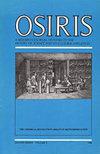The Microbial Production of Expertise in Meiji Japan
IF 1
3区 哲学
Q2 HISTORY & PHILOSOPHY OF SCIENCE
引用次数: 3
Abstract
Microbes as an object of knowledge and the scientist as an institution of authority did not exist in Japan before the nineteenth century. This essay considers the formation of these two modern categories by looking at their boundaries in late Meiji Japan (1868–1912). Charting transformations in the landscape of brewing expertise, the processes that brewing technicians used to produce molds as commodities, and finally the critical reaction of the slime-mold naturalist Minakata Kumagusu who opposed the philosophical foundations of disciplinary science, it argues that the co-production of the microbe and the scientist as new categories reveals a convergence between imported European ideas and earlier Tokugawa-era (1603–1868) commercial developments. Their convergence in turn-of-the-century Japan is highly suggestive of the ways in which the modernity of scientific institutions is entangled with industrial capitalism.日本明治时期的微生物生产技术
在19世纪之前,日本并不存在作为知识对象的微生物和作为权威机构的科学家。本文通过考察日本明治晚期(1868-1912)这两个现代范畴的边界,来考察它们的形成。书中描绘了酿酒技术领域的转变,酿酒技术人员用来生产作为商品的霉菌的过程,最后是反对学科科学哲学基础的黏液霉菌博物学家熊谷元的批判反应,书中认为微生物和科学家作为新类别的共同生产揭示了进口的欧洲思想与早期德川时代(1603-1868)商业发展之间的融合。它们在世纪之交的日本的融合,高度暗示了科学机构的现代性与工业资本主义的纠缠方式。
本文章由计算机程序翻译,如有差异,请以英文原文为准。
求助全文
约1分钟内获得全文
求助全文
来源期刊

Osiris
管理科学-科学史与科学哲学
CiteScore
1.10
自引率
0.00%
发文量
18
审稿时长
>12 weeks
期刊介绍:
Founded in 1936 by George Sarton, and relaunched by the History of Science Society in 1985, Osiris is an annual thematic journal that highlights research on significant themes in the history of science. Recent volumes have included Scientific Masculinities, History of Science and the Emotions, and Data Histories.
 求助内容:
求助内容: 应助结果提醒方式:
应助结果提醒方式:


